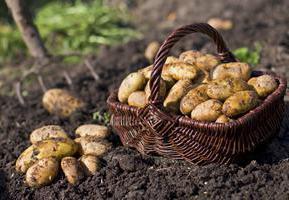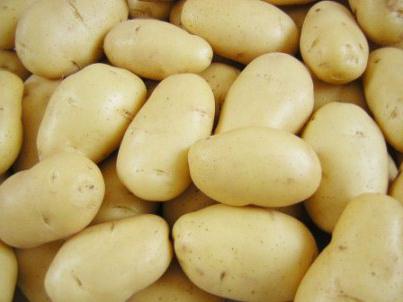Potatoes "bullfinch": description, varieties, reviews
Potatoes "bullfinch" from domesticbreeders is popular not only in Russia, but also in the near abroad. The variety is resistant to frost, excellent lezhkostyu, excellent taste and good commercial appearance. The culture is in demand by small farms and truck farmers who grow potatoes in country cottages and household plots.

Potatoes "bullfinch": description
Potato bushes are low with an erect stalk and large leaves with an even or slightly wavy edge. Flower corollas are medium in size. Inflorescence lilac.
Roots are round-oval, smootha skin of red or pink color with very small eyes. Root weight varies from 60 to 90 gr. The flesh is milky white. The average starch content in tubers is 16.8-18%.
A variety of potato "bullfinch" is distinguished by a friendly formation of tubers.
Vegetation period is 1.5 months. The average yield is 250-300 c / ha, and with proper care it is possible to harvest 350-450 c / ha.

The value of "bullfinch"
The variety has proven itself in mostregions. Potatoes were appreciated by truck farmers and owners of small farms. They noted a lot of positive qualities, for example, obtaining an early and high-quality harvest (at the first digging you can get up to 115 centners / ha), friendly formation of tubers, high yield, high taste.
Potato "bullfinch" has resistance topotato cancer, resistance to scab and viruses, as well as resistant to blight and macrospores of tubers. As with most new varieties, the bullfinch is susceptible to the nematode, which is important to consider when preparing the tubers for planting.
Potatoes are perfect for baking whole in the oven and processing for chips.

Features of planting and care
To obtain a high-quality potato harvest, it is important to carry out the following activities:
- Potato "bullfinch" is very picky about the compositionof the soil. The soil under the planting should be as light, air-permeable and fertile as possible. When carrying out preliminary sorting of tubers by size, it is necessary to reject atypical in form, wrong and affected by stem nematode and rot of tubers.
- Recently, potato plantationsconsiderable damage is caused by a black scab. Despite the fact that the potato "bullfinch" is fairly stable to it, it is still very important to carry out preventive treatment with "Phytosporin" or "Maxim" before sprouting tubers.
- Because the variety has a reduced levelresistance to the nematode, it is necessary to carry out measures aimed at increasing the plant's own forces, including the introduction of various mineral fertilizers. Excellent results were noted with the use of potassium-containing granules introduced during the digging of soil. In the spring it is desirable to make such funds as nitrophoska, "Kemira potato", urea gumatized, universal OMU "Potato", superphosphate. You can use as a fertilizer to plant wood ashes.
- After planting the potatoes for the first time are notit is recommended to water. Further, the number of irrigation should depend on climatic and weather conditions, as well as the state of the soil. Sufficient soil moisture especially needs to be maintained during budding and flowering.
- Top dressing of potatoes is desirable to be combined withfirst hilling. It is good to use a solution based on nitrogen, potassium and phosphate fertilizers. Good results show the introduction of nitrophosphate. At the first feeding you can use manure or bird droppings.

Potatoes "bullfinch": reviews
Many gardeners appreciated thisa wonderful early variety that has proved itself well on almost any type of soil and in any regions. Despite the fact that this is a novelty, the variety is considered promising for household plots. Potatoes are unpretentious, adapt well to unstable weather conditions and do not cause special problems in growing. Reviews of potato growers about this variety are usually positive. They evaluated the drought resistance, the formation of smooth tubers, on which there are no secondary tubers and neoplasms. The tubers are red or pink, which is very popular with consumers recently. In addition, the variety is attractive in that it becomes quite fragrant and crumbly during cooking. Also, the tubers are ideal for baking in an oven or on coals.












